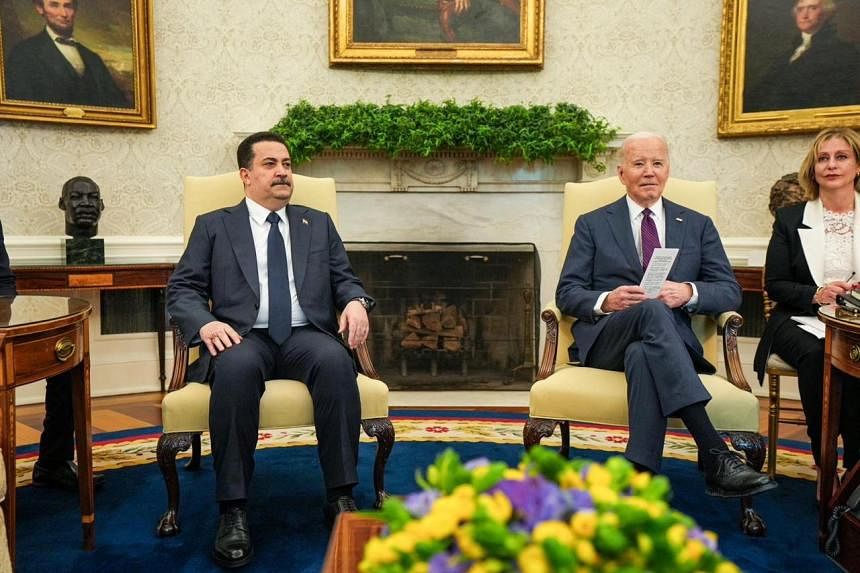WASHINGTON – US President Joe Biden said on April 15 that he wants to prevent the Middle East conflict from spreading, but vowed to defend Israel after Iran launched an unprecedented aerial attack on the key US ally.
Mr Biden also reiterated his desire for a ceasefire in the war between Israel and Hamas following the Oct 7 attack.
“Iran launched an unprecedented aerial attack against Israel, and we launched an unprecedented military effort to defend it. Together with our partners, we defended that attack,” he said, as he met Iraqi Prime Minister Mohammed Shia Al-Sudani at the White House.
Mr Biden said: “The US is committed to Israel’s security. We’re committed to a ceasefire that will bring the hostages home and prevent the conflict from spreading beyond what it already has.”
He was referring to those kidnapped by Hamas militants in the Oct 7 attack.
Israel began its campaign against Hamas in Gaza after the Palestinian militant group’s attack which killed 1,200 people and led to 253 people being taken hostage, according to Israeli tallies.
In Gaza itself, where more than 33,000 Palestinians have been killed in the Israeli offensive, according to Gaza Health Ministry figures, Iran’s action has drawn applause.
Israel’s military chief on April 15 said his country would respond to Iran’s massive drone and missile attack on April 13, which Teheran said was in retaliation for a presumed Israeli strike on an Iranian consulate building in Syria that killed 12 people, including two top generals.
Prime Minister Benjamin Netanyahu summoned his war Cabinet for the second time in less than 24 hours to weigh how to react to Iran’s first-ever direct attack on Israel, a government source said.
Israel’s military chief of staff Herzi Halevi said the country would respond, but provided no details.
“This launch of so many missiles, cruise missiles, and drones into Israeli territory will be met with a response,” he said at the Nevatim Airbase in southern Israel, which sustained some damage in the April 13 night-time attack.
US forces helped Israel take down almost all the projectiles.
Mr Biden has promised “ironclad” support for Israel but also urged it to “think carefully and strategically” before launching a response that could trigger a wider war. He said he was “also committed to the security of our personnel and partners in the region, including Iraq”.
‘Restraint’
Mr Sudani, visiting for talks on the presence of US troops in Iraq as part of an anti-terrorist coalition, called for “restraint”.
“We encourage all the efforts to stop the expansion of the area of conflict, especially the latest development,” he said, speaking in Arabic through a translator.
Mr Sudani added that he was “very eager” for an end to the Gaza war.
Iraq has been trying to stay out of regional tensions, even as pro-Iran armed groups in the country have carried out a series of attacks on US facilities since Oct 7.
The White House, meanwhile, denied that it had received advance warning of the timing or targets of Iran’s attack, which it called a “spectacular” failure.
“I’ve seen reporting that the Iranians meant to fail, that this spectacular and embarrassing failure was all by design,” National Security Council spokesman John Kirby told a briefing.
“I’ve also seen Iran say that they provided early warning to help Israel prepare its defences and limit any potential damage. All of this is categorically false.”
American officials previously said Iran passed a message through Switzerland to Washington saying it intended to respond to the Damascus strike.
US Secretary of State Antony Blinken separately said Washington did not want any escalation.
“What this weekend demonstrated is that Israel did not have to and does not have to defend itself alone when it is the victim of an aggression,” he said at the start of a meeting with Iraqi Deputy Prime Minister Muhammad Ali Tamim.
Mr Blinken said he was involved in a flurry of talks over the last 36 hours, seeking to coordinate a diplomatic response that would prevent any escalation of the crisis in the region. AFP

